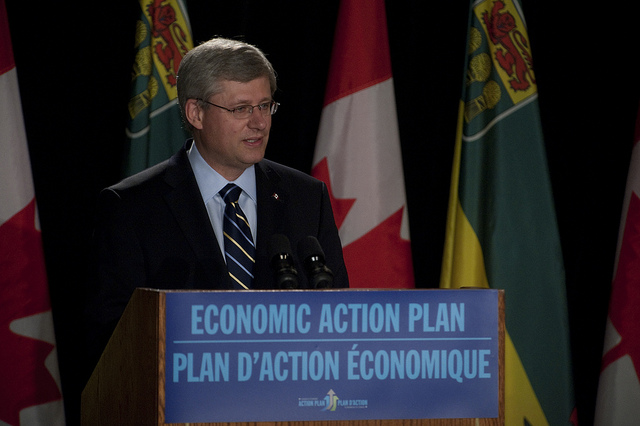A new report from Citizens for Public Justice (CPJ) on job creation in Canada arrived just as the Prime Minister said Monday he intends the next election to be about jobs and the economy. As part of a study of poverty, CPJ has published a set of fact sheets on job creation in Canada since the 2008 recession. It looks at regional and generational differences, assesses job quality and measures newly created jobs against new job seekers.
Anyone who believes what Conservative cabinet ministers have been repeating about job creation in Canada should read the CPJ fact sheets.
Carol Goar of the Toronto Star identified the CPJ report as explaining why many Canadians are still experiencing the recession. The Canadian employment rate is down: the number of jobs created (950,000) has not increased as fast as the population (1.8 million). Unemployment is stuck at 1.4 million. When talking about the unemployed, the government does not include discouraged workers, people with part-time jobs looking for full-time work, temporary jobs, or the under-employed. Add them to the total, and the real unemployment rate is one out of ten out of work.
CPJ explain about 500,000 jobs are needed to get Canada back to where it was before the recession. Stronger job growth where resource prices are strong (Alberta, Saskatchewan, Manitoba) and in construction mask weaker job growth in services and manufacturing.
Employment trends are weakest for Aboriginal Canadians. Young Canadians suffer disproportionately from unemployment — about one in five is without work.
Sadly, paid work increasingly means precarious jobs: part-time, low-wage and unstable. Older workers are relying more and more on temporary work.
Policy analysts divide over what to do about a lackluster economy. Some want to leave the market alone, most think governments need to lead in order for it to recover.
Conservatives believe the marketplace works fine, and any problems can be fixed by allowing prices to adjust. Unemployment is explained by the failure of rates of pay to fall, because of minimum wages, unions, employment insurance, welfare and other market imperfections, which need to be eliminated or reduced.
The problem with this view is that rates of pay are falling — policies to reduce wages have been successful, increasing inequality as Stephen Gordon has shown in Maclean’s. For the Harper government, business-funded think-tanks, and other supporters of the market view, this just means wages have not fallen enough. More of the same is just what is needed.
Those unwilling to wait for the economy to correct itself will want to know how it can be improved.
In Canada the standard strategy for an underperforming economy is a currency devaluation, accompanied by fiscal tightening. Exports incomes increase, import increases are cut off, and the private sector leads the recovery.
Floating the Canadian dollar down used to only require lowering Canadian interest rates below U.S. rates. Unfortunately, the U.S. beat Canada to the interest rate bottom, with a “zero bound” rate, introduced to revive American capitalism.
Historically low rates do prevail at the Bank of Canada. This is supposed to encourage recovery, though without bringing a currency devaluation, it is hard to see how it is going to happen.
Former Bank of Canada Deputy Governor William White called low interest rates having one foot on the accelerator. With the Harper government curbing spending, White observed, Canada has the other foot on the brake.
This contradictory policy needs to be fixed. The obvious choice is for the government to take the foot off the brake and spend borrowed money for needed public investments in urban transit, retrofitting buildings to reduce energy use, recreation, culture, the arts, advanced education, child care, and straight job creation.
The Harper government is ideologically opposed to government spending, but expect it to consider taking its foot off the brake by lowering taxes. Another reduction in the GST would inject new money into the economy, for instance. And it would also be an excuse to reduce direct spending (and reduce wages) further down the road.
The Official Opposition have their work cut out for them just to expose the poor Canadian economic record, let alone engage Conservatives in a rational debate based on economic evidence.
Stephen Harper does not expect Canadians to discover that job performance has been poor and that the economy is not improving, while the standard of living for most Canadians is declining. He has announced plans to prorogue Parliament, cutting the fall session short. This will limit the time for parliamentary debate and the subjects raised by the opposition.
If the economy is going to be the ballot question in the next election, as Stephen Harper suggests, Citizens for Public Justice have afforded parliamentarians and all Canadians with what is needed to examine his government’s record.
Duncan Cameron is the president of rabble.ca and writes a weekly column on politics and current affairs.
Photo: Liam Richards/University of Saskatchewan/flickr



